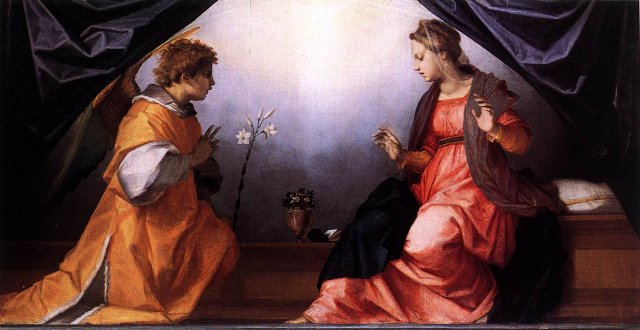It's Easter, and I'm writing about a different holiday.
Why? Simply and solely because the Easter post I want to write would be far too much work for the remainder of a day of rest after an exhilarating but exhausting week. I will celebrate Easter by not writing about it—yet. Besides, Easter is not one day, but a 50-day season, so I have some time.
On March 25 of this year, our church celebrated the Annunciation. To the best of my recollection, that's the first time, in all of our many and varied churches, that we have done so.
That celebration set off an interesting train of thought.
It's usually around Christmastime that my thoughts turn especially to the Incarnation. As I've said before, for years I unthinkingly accepted the idea that Easter should be more important to Christians than Christmas. After all, the resurrection of Christ is the one spectacular event on which Christianity stands or falls.
Or is it? If it is unique and astonishing that a man so clearly dead should in three days be so clearly alive, and alive in such a new way that he has a physical body (that can be touched, and fed) and yet comes and goes through space in a manner more befitting science fiction—is it any less unique and astonishing that God, the creator of all that is, seen and unseen, should enter his world as a human being, not in the shape-shifting ways of the Greek gods, but through physical birth, with human limitations? I finally concluded that debating which holiday is more significant for a Christian is like asking whether my left or my right leg is more important for running.
But now comes a new holiday into the mix: Annunciation. Obviously the birth of Jesus is still an important and awesome (in the literal sense) holiday. But if we're celebrating the Incarnation, aren't we about nine months too late? Figuring Jesus was conceived about the time of the Annunciation—ít's no coincidence that the feast day is celebrated nine months before Christmas—if we're celebrating the Incarnation, this would be it. So why is this holiday almost unheard of in most Protestant circles?
Thus I have some questions for other Christians:
- If your church believes, as I do, that conception is the defining moment in the creation of a unique human being, but does not celebrate the Feast of the Annunciation, why not?
- If your church believes that the defining moment in the creation of a unique human being is at some point other than conception, what is that point, and how does it affect your view of the Incarnation?
In over 66 years on this planet, more than two-thirds of them as a professing Christian, I have never asked myself these questions. I am astounded at my ignorance. To be fair to myself, I've never heard anyone else ask them either.



